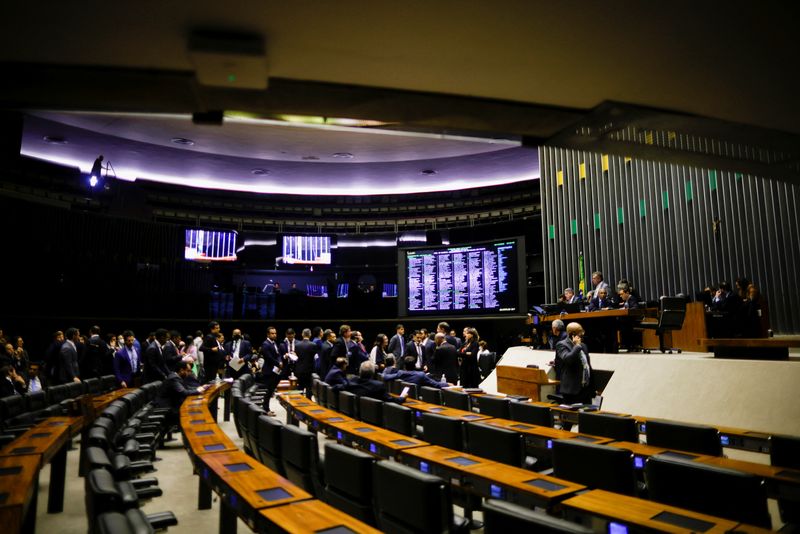
© Reuters. A general view shows the plenary of the Chamber of Deputies during a session to vote on a constitutional amendment that increases the government spending ceiling in Brasilia, Brazil December 20, 2022. REUTERS/Adriano Machado/File Photo
By Maria Carolina Marcello and Gabriel Araujo
BRASILIA (Reuters) -Brazil’s lower house of Congress approved on Friday the main text of a tax reform that will restructure the country’s complex consumption taxes, a move President Luiz Inacio Lula da Silva touted as a “great victory”.
Such a reform – previously attempted by various administrations without success – is a key step in Lula’s plan to boost growth.
Lawmakers at the chamber voted in two rounds to approve the reform and are set to conclude voting some amendments later in the day, after which the bill will be sent to the Senate, where it will also be voted on in two rounds.
“It’s a historic moment and a great victory,” Lula tweeted after the voting. “Brazil will have its first tax reform of the democratic period … We are working towards a better future for everyone.”
Starting in 2026, the reform plans to over eight years merge five levies currently in place into a value-added tax (VAT) with separate federal and regional rates, which will be defined later by a complementary law.
The approved proposal also shifts the tax basis from where goods are produced to where they are consumed over a 50-year transition period, starting in 2029.
The change, which is expected to benefit Brazil’s wealthier and more populous states, is likely to encounter stronger opposition and calls for broader compensation measures in the Senate, where state governors hold greater influence.
Markets reacted positively to the lower house approval, with Brazil’s real strengthening more than 1% against the dollar, while benchmark stock index jumped 1.4%.
“For a while, many doubted that the reform would be approved,” economists at JPMorgan (NYSE:) said. “Long-term transition means that complexity will remain high for some time, but we look for enhanced productivity and higher growth down the line.”
‘A NECESSITY’
The lower house approved the reform by 382-118 in the first round of voting held late on Thursday. Lawmakers then passed it in a second round overnight by 375-113, a wide margin as 308 votes were needed for the proposal to be approved.
“It’s a necessity for our economy so our productivity can advance,” Finance Minister Fernando Haddad said. “The outdated way in which taxes are currently organized greatly hinders industry, commerce and services.”
Haddad told reporters on Friday he does not expect the reform to face much opposition in the Senate in the second half of the year, noting he had already received calls from senators praising the approved text.
Senate head Rodrigo Pacheco later congratulated the lower house for its decision and said it was now “up to the Senate to fulfill its role in delivering this important reform,” reinforcing his support to the bill.
The approval was a major win for lower house Speaker Arthur Lira, who strongly backed the project, with lawmakers from the big tent “Centrao” bloc he leads overwhelmingly voting to pass it.
However, it represented a huge defeat for former President Jair Bolsonaro as he tries to lead the opposition to the Lula administration despite being barred from running for office until 2030.
The former far-right leader campaigned against the reform and urged lawmakers to vote against it, saying he could never back something coming from Lula’s leftist Workers’ Party. Bolsonaro’s efforts were in vain and even some members of his party voted to pass the bill.








